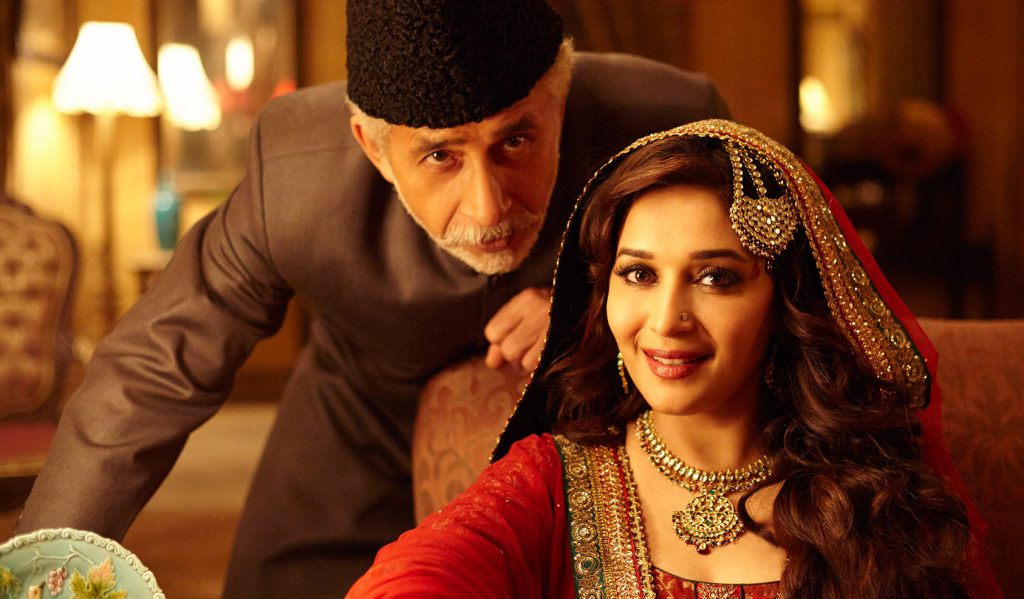Only a few days ago, I was in a deep discussion about standards of film criticism with a colleague. I had commented specifically on how Western critics rarely feel the need to touch upon the technical aspects of the films in their reviews- preferring to dive straight into storytelling and tonal analysis. Indian reviewers consider it their duty to analyze each department, from the sound design, costumes to editing and lyrics. These check boxes can be attributed largely to the fact that most Indian films do not get the basics right. Storytelling, as we have painfully learned, is often secondary priority – once the acting, cinematography and choreography are critiqued and shredded.
Dedh Ishqiya, a sequel to Abhishek Chaubey’s fiercely genre-bending Ishqiya, is one of those rare efforts that compiles us to dive directly into the intricacies of plot, characters and the philosophy behind the advent of thrill-a-moment comic thrillers. Because we can afford to. Every other technical department is handled with precision; including the hinterlandish production design, dust blown color palette and considerable cinematic homage.
Once we take this remarkable achievement for granted, as we do with most Vishal Bhardwaj (VB) productions, we must carve our way through thick poetic layers of jugalbandi, sher shayaris, Urdu literature (a total of ‘dedh’ non-Urdu lines in the film) and Madhuri Dixit’s arched eyebrows. As Babban (Arshad Warsi) and Khalujan (Naseeruddin Shah) continue ransacking their delightfully thuggish ways through a random assortment of gangs and damsels, determined not to repeat their ‘mistakes’ from Part 1 (mirroring the filmmakers’ intentions), it is hard not to notice that Chaubey and Bhardwaj are trying to pull off a magic trick themselves here.
Of course, everyone’s identity remains a mystery, with the usual double-triple-cross climax in store. We have learned this from Vidya Balan in its predecessor; and there is, hence, bound to be much deceit on the storytelling front. The important skill lies in how these loose ends are made to look like an illusion under the garb of lust(er) and authenticity, which is where Abhishek Chaubey’s assured direction comes to the fore. These flaws are impossible to discuss without giving away spoilers, so let’s just say that the filmmakers manage to dress some gaping wounds with entertainment, entertainment and plenty of individually brilliant scenes – not least the ‘Mexican’ standoffs, the ‘court of shayars’ competition and some consistent crackling chemistry between Arshad Warsi and Nasseruddin Shah. There is massive subtext and much is lost in translation between Muniya (Huma Qureshi ; candidly spunky as usual) and Begum Para (Madhuri; still in Devdas mode), and one wishes the director had been braver to go the whole hog. His tendency to shift focus from the lives of one character to another for extended periods of screen time in the first half casts shadows over the whereabouts of the rest of the quirky gang; much of which is very important, knowing that the second half will be full of double jeopardy and revelations.
Bhardwaj’s dialogue, constructed delicately with peals of poetry and melancholy, could be lost on many; but you can still sense the beauty of his words, thanks to flawless hat tips by Jaan Mohammed (the inimitable Vijay Raaz in another hilarious Delhi Belly avatar) and Ifthekkar (Shah, in his most effective contemporary role) as imposters vying for Begum Para’s hand. One look at Shah’s puppylove eyes and it is almost easy to shut out the only surface flaw of this film- forgettable music. Bhardwaj, for once, doesn’t score where he is arguably at his alternative best; and I personally missed the hilarious opportunistic Accordion pieces- especially his delightful placement of these strands – that lit up most of Ishqiya and the unforgettable single Dil Toh Bachcha Hai Ji. This, and Madhuri’s mild performance – it would be nice to see her in the contemporary world again – form quibbles in what is otherwise a largely enjoyable sequel to an original character-caper style of filmmaking.
For VB loyalists, it will be heartening to see that his legacy is in good hands. If they’re brutally honest in their assessment, even they will concede that the Master and his protege are still almost-Auteurs, and their efforts lack narrative consistency, relying too much on parts of the whole. Chaubey seems to be bridging that gap, but life outside Ishqiya territory beckons for a better idea of his evolution. While their scene construction is second to none, and we can’t complain about little gems like ‘Bhayankar Chilled Beer’ signs in a village or a deserted station called ‘Bap’- what is wrong in striving for more?
Urdu, Hindi, Comedy, Romance, Thriller


